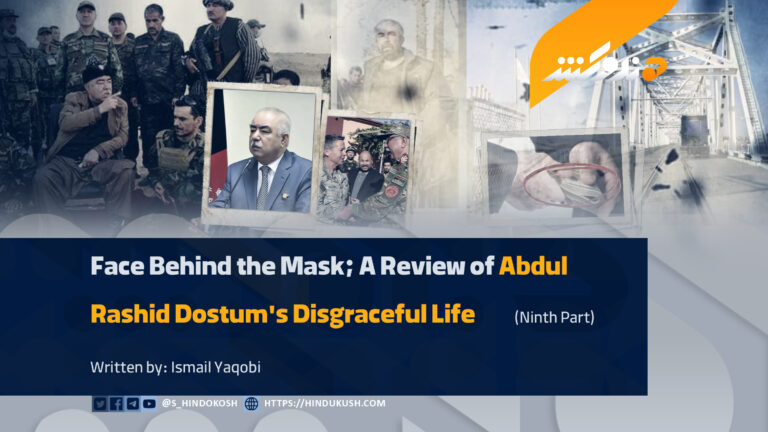Nineth Part
Written by: Ismail Yaqobi
After the republican regime came to power with the full support of the United States, a new opportunity arose for the warlords to increase their wealth and possessions by outdoing each other in oppression and crime against the suffering people of this land, to plunder the public treasury, and to inflict any kind of tyranny on this nation like untamed bullies.
In the meantime, Abdul Rashid Dostum, whose shameful record during the Soviet occupation of Afghanistan and subsequently during the civil wars was filled with innocent blood, did not remain silent during the republic either, as expected. He spared no effort in corruption and crime and did not refrain from any act of ugliness unless he left his mark on it.
During the twenty years of the republican regime, although many of the corrupt general’s crimes were covered up due to his high influence within the corrupt government apparatus, the sheer volume of these wrongdoings was so great that despite these efforts, they were still exposed and revealed, allowing the people of Afghanistan to witness the heinous acts of these individuals firsthand.
The looting of public assets, including customs revenues from Hairatan, smuggling and the monopoly of natural resources, the seizure of countless lands and the displacement of the indigenous people of those areas, the promotion of ethnic and racial prejudices and violence, murder, torture, harassment and sexual assault are just a small part of Dostum’s shameful actions, each of which we will dissect in a separate section, Allah willing.
Undoubtedly, ports and customs are vital gateways for a country’s national economic growth and investment by traders. However, in Afghanistan during the twenty years of the republic, these important and fundamental centers were under the control of warlords, and in addition to the widespread corruption in these customs, all legal revenues went into the pockets of a few notorious individuals.
Hairatan Port, located on the border of Uzbekistan and Balkh province, is considered one of Afghanistan’s most important trade gateways, generating billions of Afghanis in customs revenue annually. Due to its strategic location on the trade route to Central Asia, this port had become the heart of financial corruption in northern Afghanistan during the twenty years of occupation.
Abdul Rashid Dostum is known as one of the key figures accused of plundering the port’s resources. Dostum’s control over Hairatan port dates back not to the rise of the republican regime but to the 1980s, when this important port was known as “Little Moscow.” Dostum, who at that time was collaborating with the Soviet occupiers, amassed a huge fortune thru smuggling networks and informal control of customs.
After the republic came to power in 2001, Dostum returned to power with the support of the American occupiers and their allies, consolidating his influence over the north, particularly Hairatan. From that day on, due to the inefficiency of the republican regime and its inability to deal with warlords like Dostum, the revenues of Hairatan port, which should have been deposited into the national treasury, often flowed into his pockets and those of his associates.
According to a 2014 report by the Afghan Ministry of Finance, Hairatan port generated over 25 billion Afghanis (about $700,000 at the time) annually; however, the majority of this revenue did not reach the public treasury due to systemic corruption, but was distributed among individuals affiliated with Abdul Rashid Dostum thru mafia networks under his command.
These networks included not only hired armed commanders but also high-ranking government officials, customs employes, and even some members of the Balkh Provincial Council, who turned a blind eye to widespread corruption in exchange for their share. As a result, Hairatan port, which could have been one of the main sources of Afghanistan’s economic development at that time, had become a center of looting and plunder.
Note: The articles, essays, and comments published by the Voice of Hindukush only reflect the views of the authors & writers and do not necessarily represent the agreement of the Voice of Hindukush.




